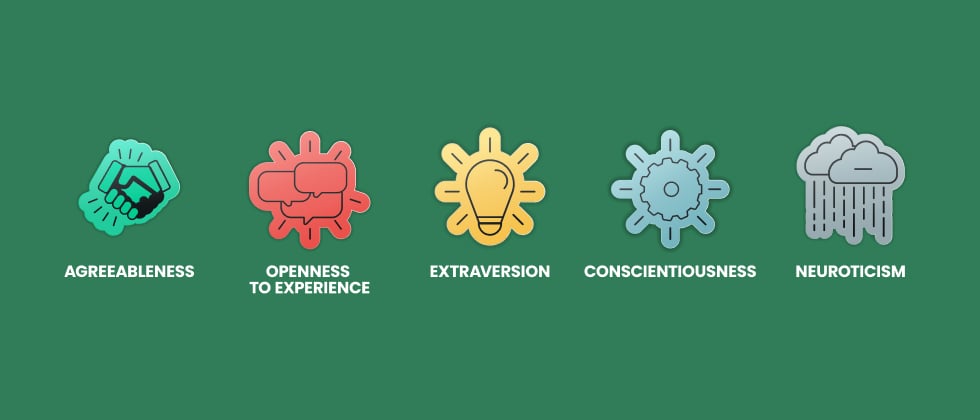
Personality traits: How to understand and use them
Your personality shapes your love life. In this article, we discover the big five personality traits and how they impact love and connection—helping you building stronger bonds.
Maybe you’ve heard of Myers-Briggs and Enneagrams, but have you heard of personality traits? According to years of psychological research, everyone’s personality is based on a combination of the five basic personality traits – openness, conscientiousness, extraversion, agreeableness, and neuroticism (commonly spoken collectively of as OCEAN).
They also play a major role in dating and relationships, since your personality plays a major role in the dynamic you have with your partner. In this article, we’ll look at the big five personality traits in detail, how to identify them, how they can affect your relationships, and how to work with your personality traits to make dating easier.
What are personality traits?
Personality
Noun
The American Psychological Association (APA) defines personality as “individual differences in characteristic patterns of thinking, feeling, and behaving”.
Everyone has a unique personality, a combination of their preferences, mannerisms, behaviors and feelings. There are several tests to determine exactly what your personality is, one of which is the Big Five personality trait model. Also known as the Five-Factor model, this model says that our personality is determined by where we fall on a spectrum when it comes to five major traits:
- Openness
- Conscientiousness
- Extraversion
- Agreeableness
- Neuroticism
Where you fall on the spectrum on each of these traits defines your overall personality. The concept of personality as a psychological concept has a long history, from Freud’s idea of the id, ego and superego to Maslow’s hierarchy of needs, to Lewis Goldberg, who in the 1960s came up with the five-factor model of personality traits that we still use today.
Getting to know these traits better is important because personality traits and compatibility are strongly interlinked. For instance, someone who is very neurotic probably isn’t a good match for someone who is very easy-going. On the other hand, people with similar levels of extraversion are likely more compatible than an introvert-extravert pair.

The Big Five Personality Traits
So, what are the big five personality traits? Let’s take a look at each of these behavior traits in turn:
Openness
Sometimes also called intellect or imagination, openness to experience is how willing you are to try new experiences, how well you do at thinking out of the box, and your ability to be vulnerable. Someone who has a high level of openness likely loves learning, enjoys arts and culture, has a creative hobby or career, and likes meeting new people. On the other hand, if you have a low level of openness, you probably prefer routine over variety, stick to what you know, and prefer art and entertainment that isn’t very abstract.
Conscientiousness
Conscientiousness can be defined as the ability to effectively control impulses, act in ways that are socially acceptable, and work towards goals. It also involves being good at delaying gratification, working within the rules, and planning and organizing things. If you have a high level of conscientiousness, you’re likely to be a planner, succeed at school and on the job, be a good leader, and be determined in the pursuit of your goals. If you have a low level of conscientiousness, however, you’re likely to procrastinate, or be impulsive, impetuous, or flighty.
Extraversion
You’ve probably heard the words introvert and extrovert before. Extraversion is basically an indicator of where someone draws their energy from. Generally, the more extroverted you are, the more you tend to draw energy from interacting with others, while introverts tend to be drained by interacting with people and need solitude to recharge. If you’re an extrovert, you tend to seek out opportunities for social interaction, are gregarious and prone to action rather than contemplation. If you’re an introvert, you tend towards being quiet, reserved, introspective and thoughtful.
Agreeableness
While extraversion is focused on energy, agreeableness is more about how well (or not) you get along with other people, and your relationship with them. If you have a high level of agreeableness, you’re likely to be well-liked, respected, and sensitive to other people’s needs. You’re not likely to have enemies, and are affectionate to your friends and loved ones. You’re also sympathetic to the plight of strangers. On the other hand, if you’re low in agreeableness, you’re not as likely to be trusted or liked. You tend to be callous, blunt, rude, ill-tempered, antagonistic, or sarcastic.
Neuroticism
Neuroticism refers to a person’s general temperament and emotional stability. It depends hugely on how confident and comfortable you are in your own skin. If you’re high in neuroticism, you’re likely to be prone to anxiety, sadness, worry, and low self-esteem. You may be temperamental or easily angered, and it’s likely you’re self-conscious and unsure of yourself. If your level of neuroticism is low, you’re more likely to feel confident, sure of yourself, and brave.
According to psychologists, all five traits exist on a spectrum – someone might be high in extraversion but low in neuroticism, or high in agreeableness but low in conscientiousness. Generally, everyone displays at least some level of all five traits.
Identifying your personality traits
Okay, so now you know what personality traits are. You might be wondering, ‘What sort of personality do I have?’ Luckily, it’s never been easier to at least get a rough idea of what your personality traits are – there are all manner of personality assessments available, from simple tests on the internet to official ones from recognized institutes.
For the Big Five personality traits, the most popular test is called the Big Five Inventory. It’s a list of about fifty statements, about which you’ll be asked to agree or disagree, on a scale of 1 to 5. Based on your answers, your results will show you where you fall on a spectrum for each trait. For example, you might score high in neuroticism and low in openness, or high in openness and low in extraversion.
Whatever your results are, remember that they’re not a judgment; they’re a tool. There are no right or wrong traits – each one has its strengths and weaknesses. A personality test like the Big Five Inventory gives you a better idea of who you are as a person, which can then help you make better, more informed dating choices.

How personality traits affect dating
Your personality traits play a key role in your relationships – after all, since your personality is who you are, it affects your interactions with everyone around you, especially the people you care about. Where you fall on the spectrum in the Big Five personality traits affects your relationship in the following ways:
Emotional expressiveness
Where you fall on the spectrum for each personality trait will have an impact on how you express things and communicate with people in relationships. For instance, if you have a high level of openness, you may find it much easier to express different emotions in an authentic way. This helps a lot with fostering emotional intimacy and strengthening relationships. On the other hand, if you’re more on the neurotic side, you may worry about what your partner thinks of you if you let yourself be open and vulnerable. This can come across as an unwillingness to connect and can lead to misunderstandings and fights.
Emotional responsiveness
Your personality shapes your ability to be empathetic, how much support you can or are willing to give, and how attuned you are to other people’s emotions. For instance, if you have a high level of agreeableness, your levels of compassion and empathy are likely to also be high. This means that you’re more likely to notice the emotional cues others are displaying and have a positive response to them. On the other hand, if your agreeableness is low, even if you do care deeply for someone, you may find it hard to show positive emotions – you may think you’re being supportive by offering constructive criticism, but it might have the opposite effect than you intend.
Emotional regulation
The ability to regulate your emotions is key to both emotional well-being and healthy relationships. People who are conscientious will find keeping their emotions in check easier, which helps them be stable and resilient in their relationships. On the other hand, if you’re highly neurotic, you may struggle to regulate your emotions, react emotionally to stressful situations, and generally struggle with stress, which could lead to misunderstandings and conflicts.
Conflict resolution
Every relationship has its fights, but your mix of Big Five personality traits will influence how you deal with conflicts and negotiation. For instance, if you’re high in openness, you’re likely to be more open to creative solutions than someone who isn’t. Or if you’re extroverted, you’re more likely to want to communicate openly and solve problems together, while someone more introverted might avoid the problem or withdraw, making finding a solution more difficult.
Relationship satisfaction
Your specific mix of personality traits has a role to play in the quality and stability of your relationships. Studies have shown that people high in agreeableness and conscientiousness report greater relationship satisfaction and longevity1. They attribute their happy relationships to mutual respect, trust, and effective communication.
Knowing what your personality traits are can help you work around any issues they may cause. For instance, if you know you’re not naturally an open person, you can work to make sure your partner knows how you feel about them.
Understanding partner compatibility
One important thing to remember when it comes to personality traits and relationships – in the Big Five model, everyone exists on a spectrum when it comes to each trait, and most people’s personalities are a blend of all five traits rather than an extreme of one or two characteristics. Plus, while your personality is a key component of who you are, it’s not the only factor in your relationship; your attachment style, the cultures you and your partner come from and live in, and the experiences you’ve had – both in previous relationships and more generally – also influence your odds of relationship success.
Key elements to a successful relationship include open, honest communication, a willingness to adapt, compromise, and mutual respect. Understanding our own personality traits—and those of our partner—can help us form stronger connections. For example, if you’re extroverted and your partner is more introverted, you can plan dates that cater to both your needs. Similarly, if your partner is more neurotic, offering reassurance can strengthen your bond. While personality plays a role in dating, the actions we take within the relationship are even more crucial to its success.
Personality traits are a key part of your relationship toolbox
‘What type of personality am I?’ is a question a lot of us have had and tried to answer at some point in our lives. Something like the Big Five model is a wonderful tool to understand why we are the way we are and why we behave the way we do, especially in relationships. That said, the relationship between personality traits and compatibility isn’t set in stone; research shows that with effort, time, and the willingness to do so, you can indeed change aspects of your personality2. It’s something to keep in mind if you think you have qualities that are keeping you back from finding a happy relationship.
That said, no matter what kind of personality traits you have, there’s someone out there for you – and eharmony can help you find them. Our unique Compatibility Matching System does a deep dive into your personality and finds you eligible singles who share your values and want the same kind of relationship you do. Sign up for eharmony and get started on the road to finding real love today.
Your search for a great relationship has never been easier with groundbreaking overhaul of the eharmony you know and trust.
Journal of Research in Personality: Goals to change personality traits: Concurrent links between personality traits, daily behavior, and goals to change oneself.
We regularly review and update our articles to incorporate the latest research, expert insights, and study findings, ensuring you receive the most relevant information. Learn more about our editorial process.
- Current Version
-
-
Written by
eharmony Editorial Team -
Editorially reviewed by
Copy Editors -
Editorial quality review by
eharmony Editorial Team
-
Written by









